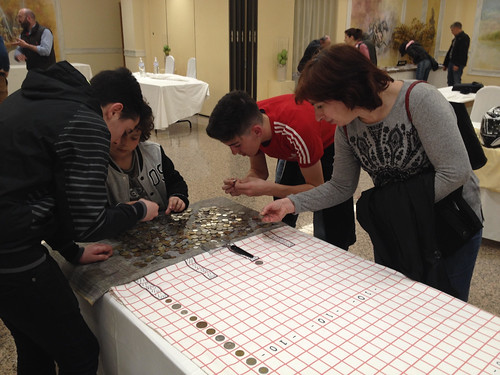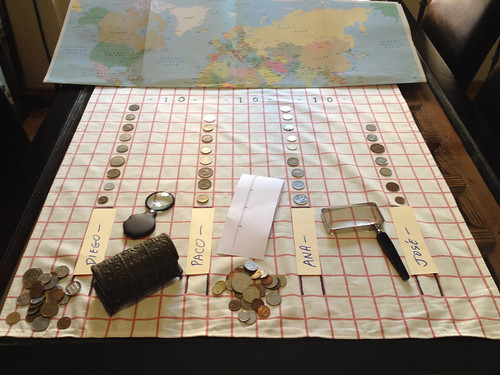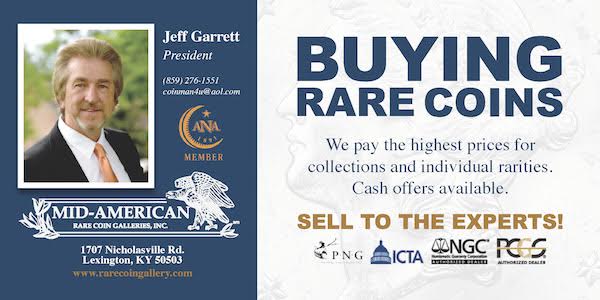
PREV ARTICLE
NEXT ARTICLE
FULL ISSUE
PREV FULL ISSUE
INTRODUCING: WORLD COIN GAMESAuthor Gary Beals of Segovia, Spain writes: Here is a project I have been working on. I think those buckets of coins many dealers have could be part of the answer - games played with coins in a way that sparks a desire to learn more and have fun with friends. Gary has developed some detailed instructions with rules and gameboards. Here's an excerpt to give you the flavor. For more information, Gary can be contacted at segovia.gary@yahoo.com . -Editor
 Coin collecting is as sedentary as an iPad but it delivers a direct physical connection to history, geography, politics and life around the world. Each coin we touch is something real, something that has actually been used by someone else — someone very different from us as we look at a mound of world coins. Each coin has its story to tell. Can we numismatists make those stories as interesting as the flashy games with their full color images of warriors, farms, birds and candy? Can hypnotic digital images be partly replaced with the simple authenticity of coins? We can actually learn some important techniques from these computerized games. Their software knows precisely when a player is getting low on patience or getting frustrated. The games know when to provide positive feedback, bump someone up to a higher level of play or give out a reward. They make the interface addictive so players want to come back. Can we use a low-tech version of this to help kids become collectors? To use an industry buzzword: Are we driving value for the user? We'd better do something because Big Tech with Big Money has really got a grip on how human behavior works and how to change it to make sales. The digital technologists know that the brain has weak pathways in making sound decisions for long-range goals. That is not where they work. They look at another more controllable part of the brain that can automatically be manipulated with suggestions. If we want to create new behaviors in kids — or anyone else interested in coin collecting — it is the habit-forming part of the brain we must deal with. There is a three-part pleasure anticipation process involving a trigger, then action and a reward. This is engineering for surprise and delight. Snapchat uses emoji — and coin collecting uses heraldry. Is that a fair fight? Can a pile of coins and a few caring collectors make this happen with youngsters? We can hope. The spark of competition exists in these games. We could see the games move from a single junior high school to a regional event. Just as spelling bees began as a newspaper chain promotion 90 years ago, we can hope that coin games can create a fascination that will change lives. What is the typical or most common age when kids’ interest in coins can be captured? What are the most common types of collecting? Who gets a child started most commonly? This game works with the presumption that a lot of kids would enjoy looking through mounds of coins from nations across the globe and seeing how many they could identify. Get dealers to donate bulk world coins, and prizes for the kids. Keep in mind that while kids often get interested in coins because of a parent’s hobby, the opposite is also true. Back about 1958 I started collecting and my dad got caught up in the fun and began his own collection. Dealers take note: As a high school and college age kid I spent several hundred a year on coins, but my dad dropped thousands into the hobby. We discovered something interesting during the first test / prototype games at a coin show: The games seem more fun with teams of players than with individual competitors. It also gets more kids involved in the activities. So, we recommend teams of three players with three or four teams playing.  World Coins Game 1: Number of players at a time: Maximum of 4 teams. World Coin Game 2: Rules: This is a game of speed. The first person with a coin made on each of 6 continents wins. In case of a tie, two coins on first five continents wins World Coin Game 3: World Coin Game 4: News media coverage for your kids game A provocative headline might work: What is your money IQ? I think this is a GREAT idea. With teams, the players can help help each other with recognizing countries and deciphering legends. It's a fast-paced hands-on activity that keeps everyone interested.
I encourage everyone who belongs to a local club or runs coin events to contact Gary for more information. Give it a try! And I don't think it needs to be limited to kids, although there could be separate kids-only,
adults-only, mixed, or kids-vs-adults games. Is your Coin-IQ better than a fifth-grader's? -Editor
 Wayne Homren, Editor The Numismatic Bibliomania Society is a non-profit organization promoting numismatic literature. See our web site at coinbooks.org. To submit items for publication in The E-Sylum, write to the Editor at this address: whomren@gmail.com To subscribe go to: https://my.binhost.com/lists/listinfo/esylum All Rights Reserved. NBS Home Page Contact the NBS webmaster 
|